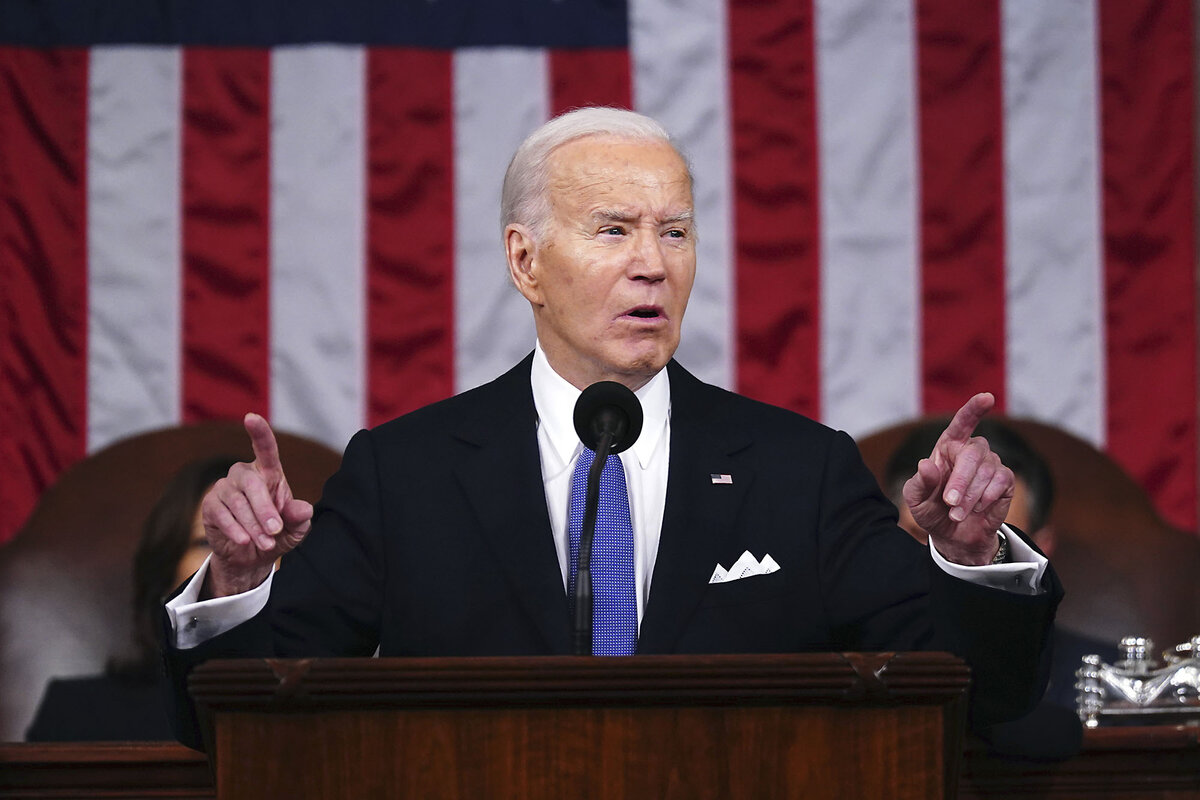Biden wants Mideast peace more than Israelis or Palestinians. That could backfire.
Loading...
| London
Joe Biden has a huge Mideast decision to make. And it goes beyond the increasingly urgent tasks of securing a hostage deal between Hamas and Israel, a cease-fire in Gaza, and relief from the humanitarian crisis engulfing its civilian population.
At stake is whether Gaza’s descent into lawlessness and hunger can be arrested, and a path toward Mideast stability – and eventual peace – can be discerned.
And the decision facing the American president?
Why We Wrote This
Will President Joe Biden ignore a longstanding cardinal rule for U.S. diplomats working on Middle East peace between Israel and its Arab neighbors – that “we can’t want peace more than they do”?
Whether to break a cardinal rule that has guided decades of American diplomacy seeking to resolve the conflict between Israel and its Arab neighbors.
That we can’t want peace more than they do.
In other words, without a readiness for engagement and compromise by the parties involved, no amount of American diplomatic heavy lifting will make any difference.
The main risk in tearing up the old rulebook is that in the current Israeli-Palestinian political climate, any full-bore U.S. diplomatic push could end in abject failure.
But Mr. Biden has to balance that risk with others. Unless Washington leads a sustained new push for Arab-Israeli peace, the situation in Gaza could worsen further. More moderate, U.S.-allied Arab governments could be destabilized, and both Iran and its proxy militias across the region could be emboldened. As a result, violence could spread more widely in the region.
That is why he has been hinting at a diplomatic intervention.
It would be based on a trade-off between things each side clearly wants. Israel would win recognition and normalization from Saudi Arabia, the most influential country in the Arab and Islamic world. In return, Israel would commit itself explicitly to a two-state peace deal and a readiness to live alongside a Palestinian state.
The first risk – abject diplomatic failure – remains all too real.
The last meaningful Israeli-Palestinian peace efforts occurred a decade ago. The events of the past five months – Hamas’ abuse, kidnapping, and killing of more than a thousand Israeli civilians on Oct. 7, and the destruction and suffering the Israeli military has visited upon Gaza – have left both sides disinclined to contemplate, much less engage in, a diplomatic exit.
Persuading Israel’s leader, Prime Minister Benjamin Netanyahu, looks like an especially tall order. Popular support for the Israeli military action in Gaza is still strong, and the public is showing little appetite for peace moves. Mr. Netanyahu’s main focus is on preserving his majority in Israel’s legislature, the Knesset.
That hinges on his far-right coalition partners, who oppose a peace deal of any sort with the Palestinians, much less the establishment of a Palestinian state.
Mr. Netanyahu’s chilly response to suggestions of a new U.S. diplomatic initiative prompted an unusually blunt speech this week by Senate Majority Leader Chuck Schumer of New York. Speaking on the Senate floor, he portrayed the Israeli Prime Minister and his “radical right-wing” partners as among the obstacles to peace.
The experiences of past American peacemakers in the region also point to the importance of getting Israeli – and Palestinian – leaders’ strong commitment.
America’s two main Mideast successes in recent decades were President Jimmy Carter’s 1978 Camp David summit, which paved the way for a historic peace between Israel and Egypt, and President Bill Clinton’s role in the landmark 1993 Oslo Accords between Israel and the Palestinians.
Yet the critical impetus came from the parties themselves. In 1978, it was Egyptian President Anwar el-Sadat’s audacious decision to travel to Israel and address the Knesset. During the Oslo Accords, it was successive rounds of secret talks between Israeli and Palestinian negotiators in Norway.
Mr. Biden does not have that luxury.
In this peacemaking effort, the United States would have to do almost all the spadework. And there would be no prospect of success unless Mr. Biden was ready not only to argue the merits of a deal, but also to place the full weight of his office and America’s power and influence behind trying to achieve it.
So why might he risk taking that plunge, especially in a U.S. election year?
Perhaps because the alternative could be even riskier: the potentially dire fallout, for Gaza and the wider region, of not acting.
The president would also be acknowledging a profound change in Arab-Israeli politics in recent years. Arab states, especially the oil-wealthy countries of the Gulf, are readier than they have ever been to normalize relations with Israel. They see not only mutual economic benefits but also a common interest in curbing the security threat from Iran.
And as Gaza’s deepening humanitarian plight hardens grassroots Arab views of Israel, a number of rulers in the region see Mr. Biden’s vision as the best – and perhaps the only – way of defusing the popular discontent that might threaten their leadership.
Washington also knows it can rely on support from much of the world for such an initiative. Its allies in Europe have made it clear they would be on board. And should the outlines of a deal make their way to the United Nations Security Council, it is hard to see how either of America’s main rivals, China and Russia, would opt to exercise their veto.
The prospect of such a diplomatic endgame, amid the continuing war in Gaza, remains distant.
Yet in contemplating whether to jettison the cardinal rule of past Mideast diplomacy, Mr. Biden may take encouragement from a 21st-century subclause.
Yes, Washington does want peace more than either Israelis or Palestinians do at present.
But other key parties, above all the Saudis, want it every bit as much.
Editor’s note: This story was updated to reflect Sen. Chuck Schumer’s floor speech on Thursday, March 14.








